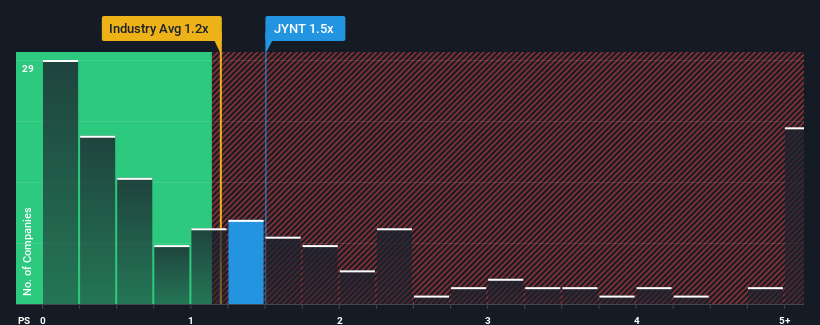- United States
- /
- Healthcare Services
- /
- NasdaqCM:JYNT
The Joint Corp.'s (NASDAQ:JYNT) Price Is Out Of Tune With Revenues
There wouldn't be many who think The Joint Corp.'s (NASDAQ:JYNT) price-to-sales (or "P/S") ratio of 1.5x is worth a mention when the median P/S for the Healthcare industry in the United States is similar at about 1.2x. Although, it's not wise to simply ignore the P/S without explanation as investors may be disregarding a distinct opportunity or a costly mistake.
View our latest analysis for Joint

What Does Joint's P/S Mean For Shareholders?
Recent times haven't been great for Joint as its revenue has been rising slower than most other companies. Perhaps the market is expecting future revenue performance to lift, which has kept the P/S from declining. However, if this isn't the case, investors might get caught out paying too much for the stock.
If you'd like to see what analysts are forecasting going forward, you should check out our free report on Joint.How Is Joint's Revenue Growth Trending?
In order to justify its P/S ratio, Joint would need to produce growth that's similar to the industry.
Taking a look back first, we see that the company managed to grow revenues by a handy 7.5% last year. Pleasingly, revenue has also lifted 71% in aggregate from three years ago, partly thanks to the last 12 months of growth. Accordingly, shareholders would have definitely welcomed those medium-term rates of revenue growth.
Turning to the outlook, the next year should bring diminished returns, with revenue decreasing 8.9% as estimated by the five analysts watching the company. Meanwhile, the broader industry is forecast to expand by 7.7%, which paints a poor picture.
With this information, we find it concerning that Joint is trading at a fairly similar P/S compared to the industry. Apparently many investors in the company reject the analyst cohort's pessimism and aren't willing to let go of their stock right now. Only the boldest would assume these prices are sustainable as these declining revenues are likely to weigh on the share price eventually.
What We Can Learn From Joint's P/S?
We'd say the price-to-sales ratio's power isn't primarily as a valuation instrument but rather to gauge current investor sentiment and future expectations.
It appears that Joint currently trades on a higher than expected P/S for a company whose revenues are forecast to decline. With this in mind, we don't feel the current P/S is justified as declining revenues are unlikely to support a more positive sentiment for long. If we consider the revenue outlook, the P/S seems to indicate that potential investors may be paying a premium for the stock.
There are also other vital risk factors to consider before investing and we've discovered 1 warning sign for Joint that you should be aware of.
If you're unsure about the strength of Joint's business, why not explore our interactive list of stocks with solid business fundamentals for some other companies you may have missed.
New: Manage All Your Stock Portfolios in One Place
We've created the ultimate portfolio companion for stock investors, and it's free.
• Connect an unlimited number of Portfolios and see your total in one currency
• Be alerted to new Warning Signs or Risks via email or mobile
• Track the Fair Value of your stocks
Have feedback on this article? Concerned about the content? Get in touch with us directly. Alternatively, email editorial-team (at) simplywallst.com.
This article by Simply Wall St is general in nature. We provide commentary based on historical data and analyst forecasts only using an unbiased methodology and our articles are not intended to be financial advice. It does not constitute a recommendation to buy or sell any stock, and does not take account of your objectives, or your financial situation. We aim to bring you long-term focused analysis driven by fundamental data. Note that our analysis may not factor in the latest price-sensitive company announcements or qualitative material. Simply Wall St has no position in any stocks mentioned.
About NasdaqCM:JYNT
Flawless balance sheet with moderate growth potential.
Market Insights
Community Narratives




